2022 Annual Report
Building the Future of Hematology


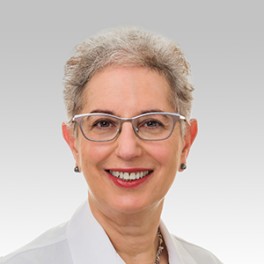
2022 was a year of celebrating the progress and promise of hematology.
ASH has always been committed to advancing the careers of the next generation of hematologists through awards, training opportunities, and career development programs. This year, we made an unprecedented investment in the future of the field by supporting the creation of 10 new hematology-focused fellowship tracks at nine academic institutions across the country. The demand for and interest in the programs was so great that four additional institutions were inspired to create new fellowship tracks of their own. This is a true testament to the appeal of hematology.
We also invested in hematology in a less tangible but equally important way, through the adoption of the term “classical hematology.” Use of the terms “benign” or “non-malignant” hematology has done its practitioners and patients a disservice, either minimizing very real and often life-threatening blood conditions by calling them “benign,” or defining the field by what it is not, as in the case of “non-malignant.” Classical hematology fosters interest and recruitment by evoking the field’s rich, centuries-long history of scientific advances that are so central to every aspect of medicine.
Indeed, one of the most rewarding things about hematology is its intersection with other medical specialties and its important role in our interconnected public health community. The connection between hematology and maternal health was brought to the forefront this year when the Supreme Court overturned Roe v. Wade. The ASH policy statement featured cases of hematologic conditions adversely affecting maternal health and served as the cornerstone for our ongoing advocacy and education efforts at the annual meeting and beyond.
Speaking of the annual meeting, there is no better way to showcase the progress we have made and the bright future we are facing in our field than this premier event. This year’s meeting offered the latest scientific and clinical content to more than 30,000 attendees, most of whom participated in person in New Orleans. The liveliness of the meeting matched that of its host city, with conversations in the halls and session rooms ranging from beignets to B-cells, from jazz to JAK inhibitors, and from Cajun cuisine to CAR-T. We continued our focus on diversity, equity, and inclusion (DEI) through not only the maternal health sessions, but also through the Health Equity Studio and DEI sessions, and inaugural networking events for members from historically underrepresented communities.
Representation was key to the advances we made this year as we continued our longstanding leadership in sickle cell disease (SCD). The extraordinary work of the ASH-led Consortium on Newborn Screening in Africa (CONSA) in screening more than 70,000 newborns and providing early interventions for more than 250 babies diagnosed with SCD reminded us that ours is a mission that transcends borders. The launch of the Bringing Sickle Cell Disease to Life podcast commemorated the great progress we have made in SCD diagnosis and treatment, and also acknowledged just how far we have yet to go.
It has been an honor and privilege to serve as president of the Society during this remarkable year of progress and promise. I wish to thank all the members of our community for their support throughout the year, and I look forward to seeing the accomplishments in store for 2023 under the leadership of my able successor, Dr. Robert Brodsky.
– Jane N. Winter, MD, 2022 President of the American Society of Hematology (ASH)
ASH supports hematologists around the world by offering various research awards, training programs, and other resources designed to enhance knowledge, research, and expertise. In 2022, ASH made a substantial investment in the future of hematology by funding a set of hematology-focused fellowship tracks across the country to provide vital education, mentorship, and research opportunities for fellows interested in pursuing careers in hematology.
ASH investment through HFFTP
Total new hematology-focused fellowship slots by 2030
This year ASH announced the institutions that were selected for the ASH Hematology-Focused Fellowship Training Program (HFFTP), an innovative initiative to address the critical need to expand the hematology workforce. ASH invested $19 million to launch 10 new hematology-focused fellowship tracks at nine academic institutions. As a result of ASH’s groundbreaking investment, three institutions were inspired to launch additional hematology-focused fellowship programs. Altogether, institutions across the country aim to provide as many as 105 new hematology-focused fellowship slots by 2030.
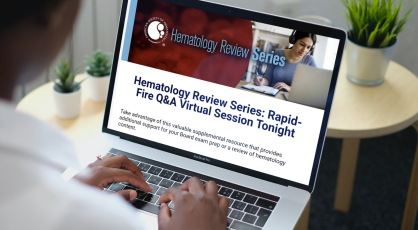
The ASH Hematology Review Series, designed for fellows preparing to take the internal medicine hematology certification exam or those desiring a comprehensive update of hematology standards of care, returned for its successful third installment. The 2022 series, airing weekly in the months leading up to fall Board Exams, included a total of 39 lectures on classical and malignant hematology topics, as well as 16 interactive virtual study sessions led by subject matter experts. A new offering of this year’s series was the “Rapid-Fire Q&A Sessions” facilitated by two members of the ASH Trainee Council. More than 5,200 people participated in the 2022 Hematology Review Series.
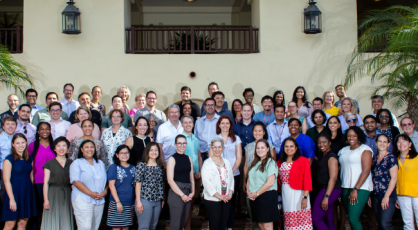
2022 was an exciting year for the ASH Clinical Research Training Institute. Due to the pandemic, the 2020 and 2021 CRTI cohorts had been unable to meet in person, so rather than inviting a new class for the 2022 program year, ASH convened the 2020 and 2021 groups for an in-person workshop in August. The first-ever merging of two cohorts was well-received, with participants benefiting from enhanced joint programming and increased networking opportunities.
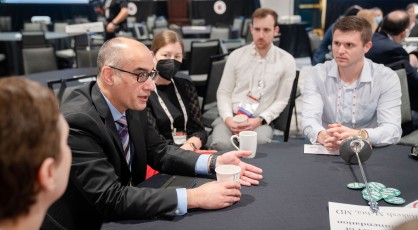
The ASH Medical Educators Institute returned as an in-person workshop for the first time since 2019 with 20 participants and 14 faculty meeting in Washington, DC, for the three-day workshop. The 2022 program implemented lessons learned from the virtual format used during the pandemic; as a result, this year’s program was more immersive than ever, kicking off with the in-person workshop in the fall, followed by monthly virtual cohort educational sessions, webinars open to all ASH members, bi-monthly small group virtual meetings, virtual happy hours, and more.
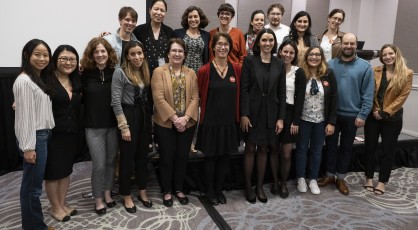
The ASH-EHA Translational Research Training in Hematology program hosted its 2020 cohort (which hadn’t met due to the pandemic) in March 2022 in France, and then followed up with a two-day program in New Orleans prior to the ASH Annual Meeting.
ASH has been engaging with federal partners and policymakers about maternal health over the past several years. The Society accelerated its advocacy in response to the June 2022 Supreme Court decision, Dobbs v. Jackson Women’s Health Organization, which overturned Roe v. Wade. ASH opposed the decision for interfering with the relationship between patients and providers and hindering patients’ ability to seek necessary medical treatment. ASH worked to inform lawmakers and the voting public of the consequences of Dobbs, meeting with elected officials in Louisiana, offering special sessions at the annual meeting through the Grassroots Network and the ASH Working Group on Maternal Health in Hematology, and encouraging ASH members to advocate. This year, 134 ASH members took action to urge their officials to protect access to maternal health care by participating in the Society’s action campaign; a total of 741 letters and 76 tweets were sent to federal and state legislators.
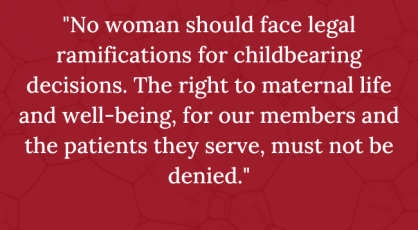
ASH worked urgently in the wake of the Dobbs decision to develop and release a policy statement on the right to maternal health care. The statement outlined the many blood disorders that put pregnant women at risk of severe, even fatal, health complications and stated that access to evidence-based medical information and lifesaving medical options are a maternal right. ASH also signed on to a letter initiated by the Council of Medical Specialty Societies and another developed by the American Medical Association (AMA) and the American College of Obstetrics and Gynecology (ACOG).
In 2022, in recognition of the growing intersection between hematology and maternal morbidity and mortality, ASH approved the creation of the Working Group on Maternal Health in Hematology. The group curated maternal health care resources including clinical, research, and policy resources, and led advocacy and education efforts such as 2022 ASH Annual Meeting sessions outlining how ASH members could get involved to effect change and improve maternal health outcomes. As part of ASH's commitment to diversity, equity, and inclusion (DEI), the Society has made a series of complimentary sessions on an array of DEI topics (including maternal health care) accessible on ASH Academy On Demand.
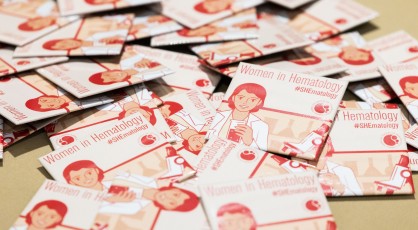
The ASH Women in Hematology Working Group, established in 2019 to increase awareness and advocacy for gender equity in hematology, celebrated Women’s History Month this year by hosting a panel discussion moderated by 2022 ASH President Jane N. Winter, MD. The panel covered challenges and opportunities unique to women in academic hematology. The virtual discussion can be found on ASH Academy On Demand. The working group also hosted an event at the 2022 ASH Annual Meeting that was designed to foster new mentorship and networking relationships for women in the field.
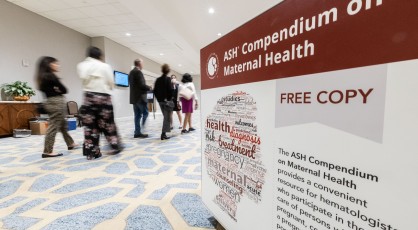
The ASH Compendium on Maternal Health, a collection of peer-reviewed articles on maternal health care from Blood, Blood Advances, and the Hematology Education Program, provided a convenient resource for hematologists caring for patients who are pregnant. It featured such clinically relevant topics as managing pregnancy with various blood disorders, preventing venous thromboembolism and iron deficiency in pregnancy, and offering sustainable care in low-resource settings. Nearly 2,500 copies were disseminated at the 2022 ASH Annual Meeting.
ASH stands steadfast in its long-standing commitment to build and nurture a global hematology community and workforce inclusive of diverse perspectives, talents, and experiences. This year, ASH continued to expand its diversity, equity, and inclusion (DEI) efforts and programs across the organization.
Minority Recruitment Initiative Awards Provided Since Inception
DEI-related Content and Sessions at the 2022 ASH Annual Meeting
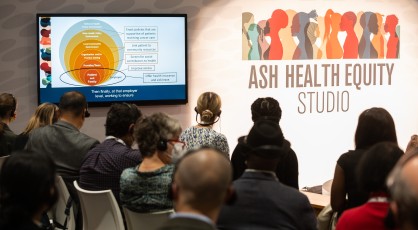
As in previous years, DEI was an important focus at the 2022 ASH Annual Meeting. The ASH Health Equity Studio offered a space for attendees to recognize inequities in health care, as well as tools for attendees to make immediate changes in their home institutions. Scientific workshops covered various health equity issues including diversification of clinical trials and novel research for patients in underserved populations such as geriatric populations and people in low-income countries. New offerings at this year’s meeting included the LGBTQIA+ Community Networking Brunch, and the Disability Community Networking Breakfast that allowed attendees to create a sense of belonging and allyship in their communities. As part of ASH’s commitment to DEI, the Society has made a series of complimentary DEI sessions accessible on ASH Academy On Demand.

In 2022, the ASH Minority Recruitment Initiative (MRI) – created to increase the participation of underrepresented minorities training in hematology-related fields – supported 45 recipients, committing more than $2 million to awardees. In addition to financial support, the awards offer recipients opportunities for research and travel, interactions with career and research mentors, complimentary access to ASH publications, and more. The ASH MRI was first created in 2003, and will be celebrating 20 years of helping create a more inclusive and diverse hematology workforce in 2023. There have been 475 awardees since its inception.
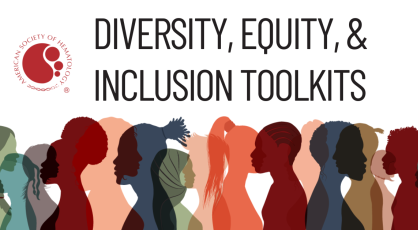
ASH released the Anti-Racism Toolkit and DEI Toolkit to help hematologists further their understanding of DEI and learn day-to-day best practices as clinicians, researchers, and educators.
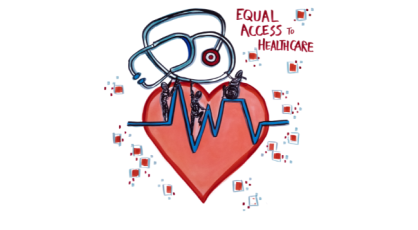
In 2021, ASH established the Health Equity Collective, a group of companies seeking to help stop the trajectory, and minimize the impact, of health care inequality. This year ASH wishes to thank eight participating companies for their contributions.
ASH is a worldwide leader in promoting and supporting clinical and scientific hematology research through innovative programs and advocacy efforts. The ASH Agenda for Hematology Research, updated periodically and meant to be a living document, serves as a roadmap to prioritize research within the hematology field. In addition, the ASH Research Collaborative (ASH RC), established by ASH in 2018, continues to make important advances in fostering collaborative partnerships to accelerate progress in hematology.
The ASH RC Data Hub is a platform capturing real-world data for research and clinical care to facilitate improved patient outcomes in blood disorders; the core programs of the Data Hub are in multiple myeloma (MM) and sickle cell disease (SCD). Since its inception, the Data Hub’s SCD program has onboarded more than 40 sites that have contributed data from more than 16,000 patients. The Data Hub launched site-based data portals to monitor clinical practice outcomes and provided funding to sites to help with data integration. In 2022, the MM program began to enroll its first five sites, and launched a feasibility study to capture patient reported outcomes using direct-to-patients tools.
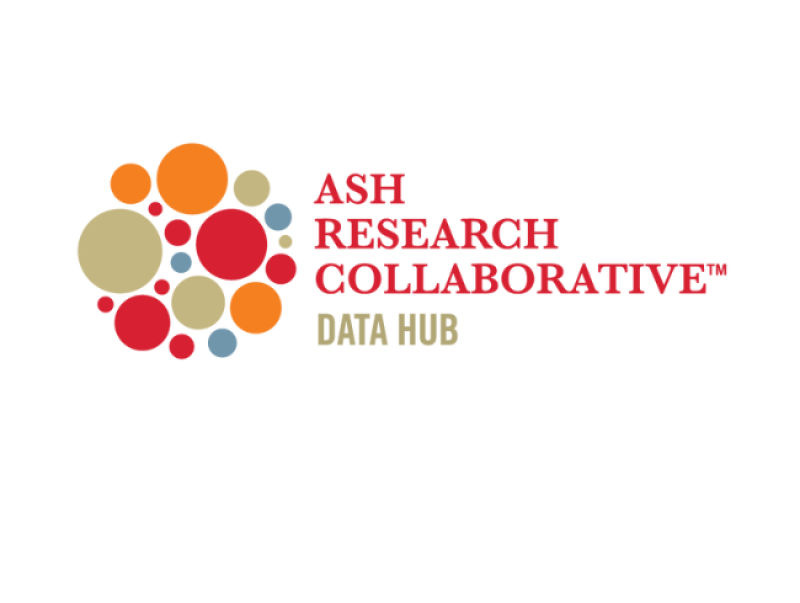
The ASH RC Sickle Cell Disease Clinical Trials Network has grown to comprise a network of 20 consortia across the United States, each comprised of research-ready clinical institutions led by experienced investigators committed to accelerating research in SCD. The Network is working to accelerate research in three ways: 1) partnering with industry to advise on clinical trial design and recruitment; 2) generating new evidence that supports high-quality care delivery; and 3) engaging with the SCD community to ensure they have a role and voice in the research process. In 2022, the ASH RC provided support for the development of local SCD community advisory boards (CABs) at each of the 20 SCD Clinical Trials Network consortia. The CAB program, which is designed to ensure communication between the SCD community and ASH RC about research, now includes more than 200 local CAB members, and a National CAB made up of representatives selected from each local CAB. In 2022, the Network launched its first partnerships with industry to provide scientific expert and SCD patient community protocol reviews, and to connect industry with Network clinical sites and investigators for trial execution.
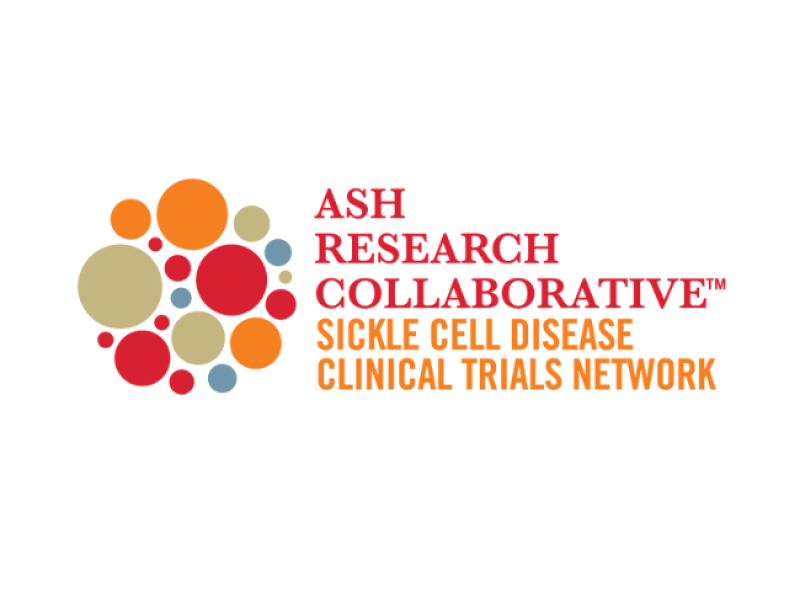
The SCD Learning Community, a quality improvement program for pediatric and adult centers aiming to improve the life course and quality of life of individuals living with SCD, held its inaugural in-person meeting in September. More than 50 participants from 14 sites met and affirmed their shared commitment to improving the reliable use of disease-modifying therapies and pain management plans in SCD care.
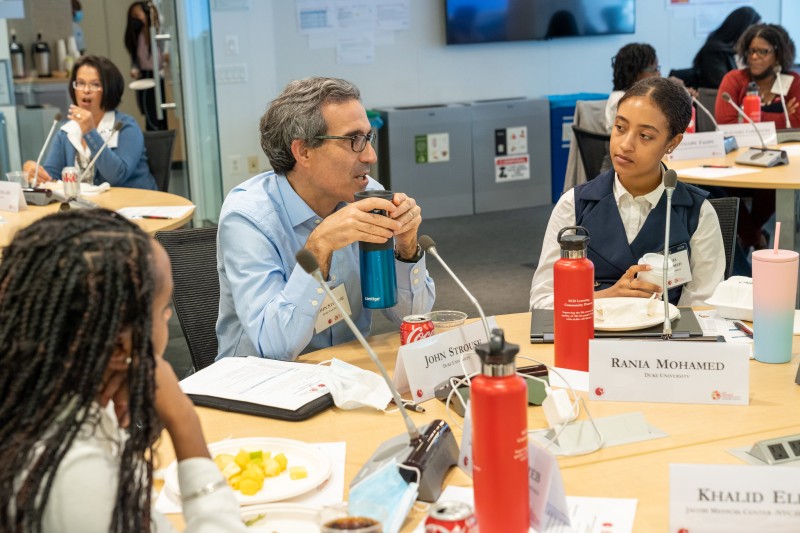
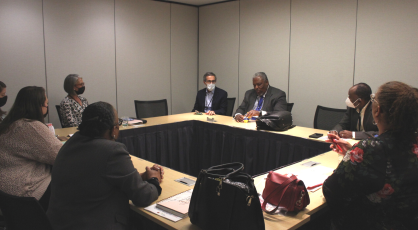
In 2022, seven new member organizations joined the ASH-led Sickle Cell Disease Coalition, which aims to conquer sickle cell disease (SCD). The Coalition now represents 113 total members that have come together with an agenda to improve outcomes for individuals living with SCD.
ASH launched Bringing Sickle Cell Disease to Life, a podcast exploring the past, present, and future of sickle cell disease (SCD) and raising awareness of the challenges faced by millions living with the inherited blood disorder worldwide. Through conversations with researchers, physicians, and patients, led by host Dr. Wally Smith of Virginia Commonwealth University, listeners learned about the history of SCD, its global impact, disparities and bias in SCD, and promising news on its management and treatment. Across three seasons and 14 episodes, the podcast amassed more than 3,500 downloads.
ASH is committed to the development of resources to help hematologists and other health care professionals improve quality of care for patients. In 2022, ASH focused on updating and adapting evidence-based clinical practice guidelines. ASH also continued the development of upcoming guidelines on care for thrombophilia in VTE and acute leukemia among adolescents and young adults, and started to develop guidelines on amyloidosis. ASH created a suite of guideline-based tools and resources to aid clinician education about the guidelines.
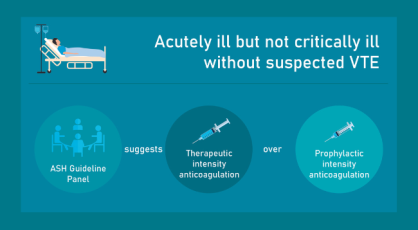
ASH continued to maintain the living Guidelines on Use of Anticoagulation in Patients with COVID-19. Throughout the year, as new data emerged, the guideline panel revisited the recommendations for the use of anticoagulation in critically and acutely ill COVID-19 patients, ensuring that clinicians could base their decision-making on the latest evidence.
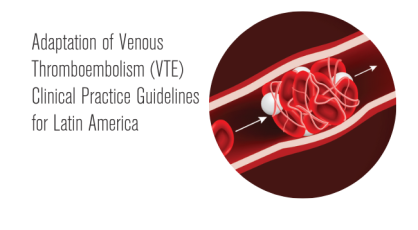
ASH partnered with 12 hematology societies in 10 Latin American countries to adapt the 2022 Guidelines for Prevention of Venous Thromboembolism (VTE) in Surgical and Medical Patients and Long-Distance Travelers in Latin America to provide evidence-based recommendations about the prevention of VTE in the region. The guidelines, published in Blood Advances, were also made available in English, Spanish, and Portuguese, and paired with clinical tools and educational resources in the languages to help patients, hematologists, and health care providers understand and implement the recommendations.
In 2022, ASH established a technical expert panel tasked with developing two quality measures based on the 2020 Guidelines for Sickle Cell Disease: Management of Acute and Chronic Pain, to drive systematic and evidence-based changes to equitable health care delivery for individuals living with SCD. The measures will be posted for public comment in 2023.
In 2022, ASH introduced the Guideline Implementation Champions Initiative, an annual recognition of practitioners who are working to implement evidence-based guideline recommendations at the point of care in their clinical setting. The successful projects of the 2022 champions (Dr. Jori May, Dr. W. Andres Vasconez Samaniego, and Dr. Jordan Shaefer) were showcased through ASH webinars, sessions at the Annual Meeting, and Quality Improvement Toolkits.
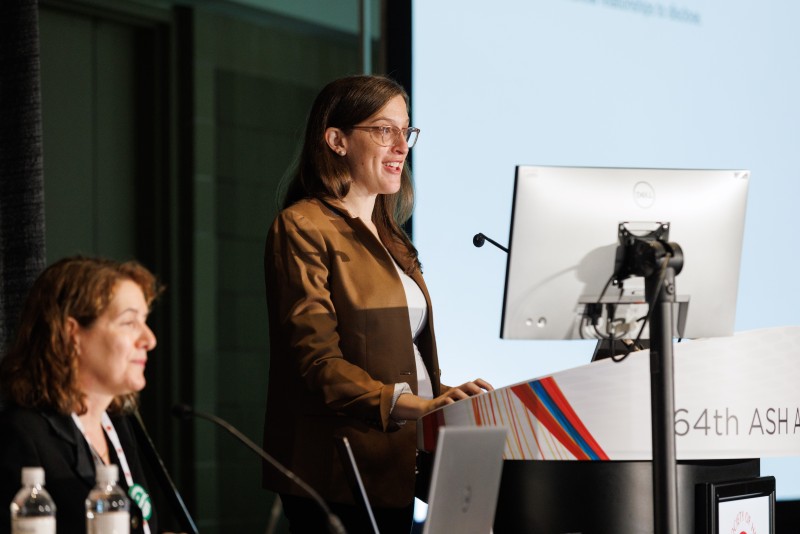
Dr. Jori May presents her team’s development of an e-consultation system that is able to automatically consult a hematologist in all cases of positive screening immunoassay for heparin-induced thrombocytopenia at the 64th ASH Annual Meeting.
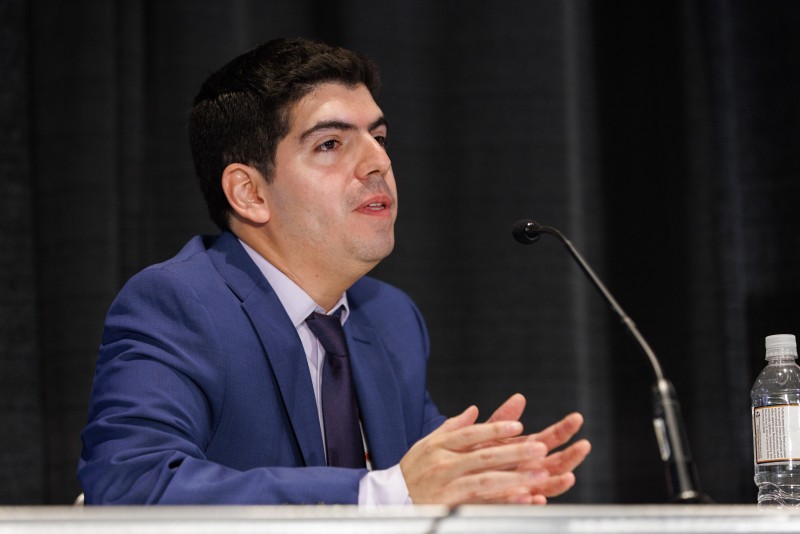
Dr. W. Andres Vasconez Samaniego tells ASH annual meeting attendees about his team’s work to streamline pain management for sickle cell disease vaso-occlusive episodes in the pediatric emergency department.
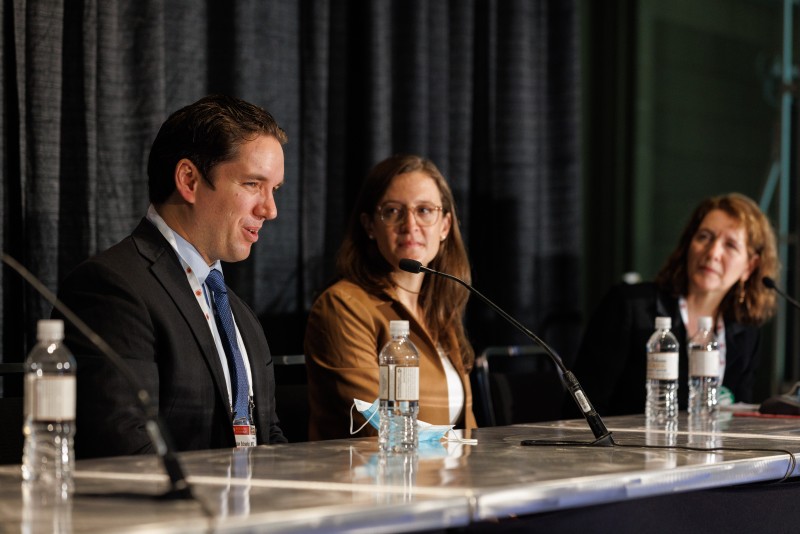
Dr. Jordan Schaefer responds to questions from annual meeting attendees about his team’s implementation of recommendations from the ASH Clinical Guidelines for the Management of Venous Thromboembolism (VTE) to reduce excess aspirin use among patients anticoagulated for VTE.
The 64th ASH Annual Meeting and Exhibition was one of the largest and most comprehensive hybrid medical society meetings of 2022. More than 30,000 global registrants enjoyed the world-class content, of which 25,000 participated in-person in New Orleans. ASH established health and safety protocols that balanced safety with the ability to meet, network, learn, and participate in scientific exchange.
Total meeting attendees in 2022
Scientific abstracts presented
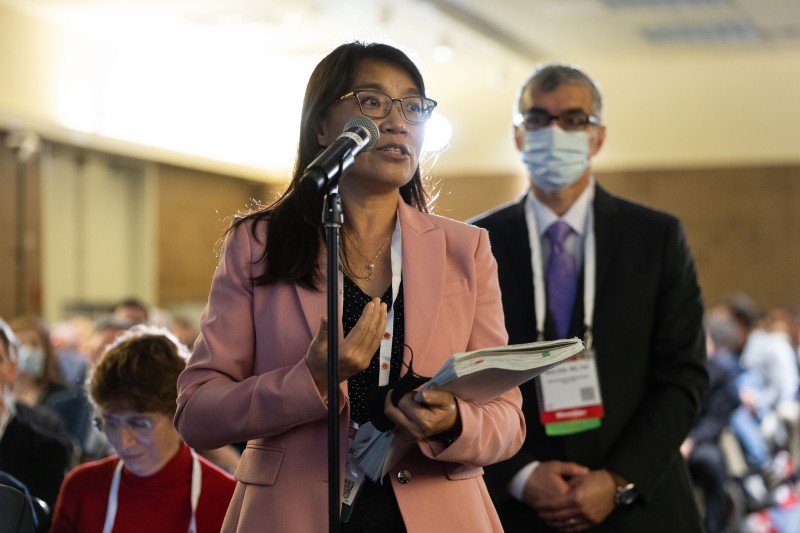
Meeting attendee asks a question during the ASH-SIE Abstract Achievement Award oral presentations.
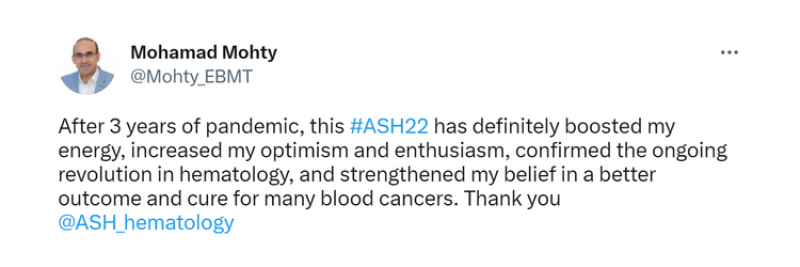
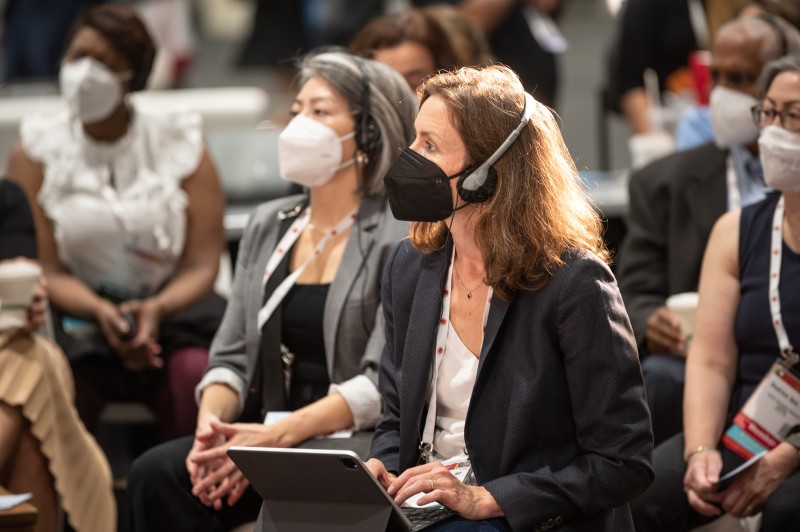
Attendees listen in to a session on cancer care disparities at the ASH Health Equity Studio.

Thousands of attendees gather to hear Dr. Martin Dreyland speak during the Plenary Scientific Program.
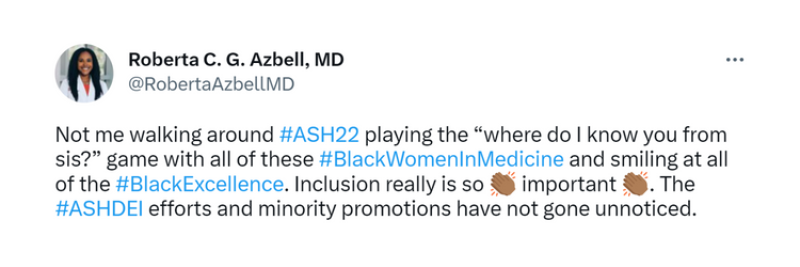
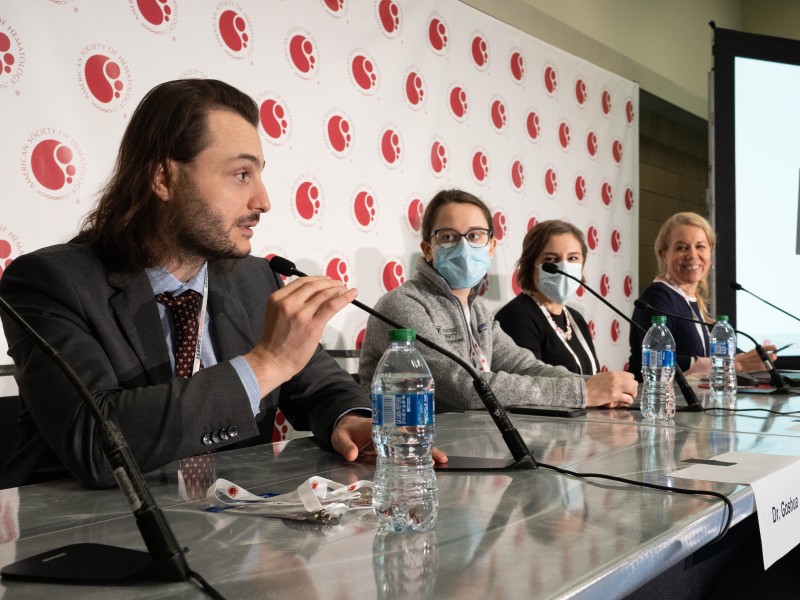
Dr. George Goshua addresses questions on pediatric care optimization during a press briefing.
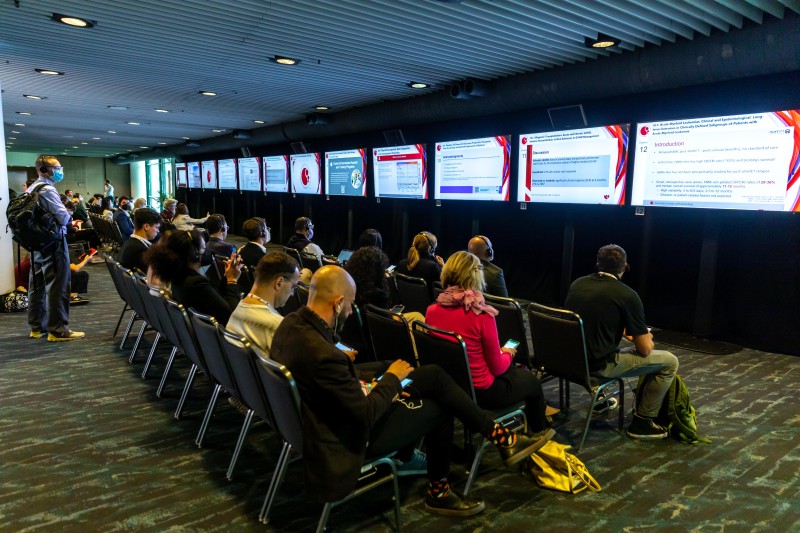
Attendees take advantage of virtual viewing rooms in New Orleans.
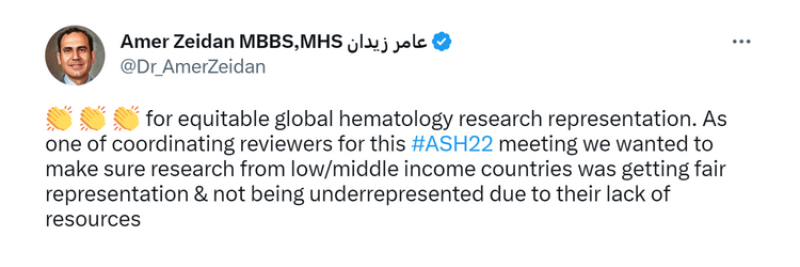
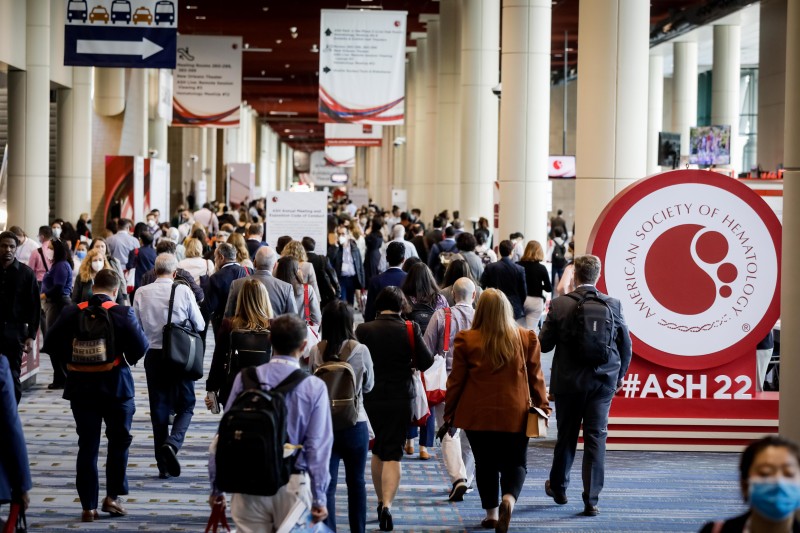
Attendees make their way through the convention center in New Orleans.
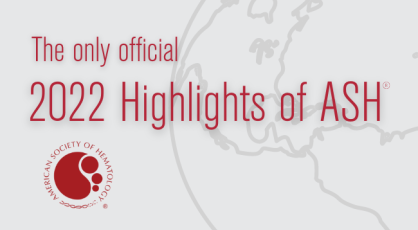
The 2022 Highlights of ASH meetings in North America, the Mediterranean, Asia-Pacific, and Latin America were presented virtually, giving participants access to clinically focused experiences summarizing the top hematology research presented at the 63rd ASH Annual Meeting along with curated regional content for Asia-Pacific, Latin America, the Mediterranean, and North America, along with interactive sessions and networking opportunities. More than 1,100 attendees joined the virtual meeting.
The 2022 ASH Meeting on Hematologic Malignancies, held in Chicago and online, featured top experts in the field presenting the latest cutting-edge clinical research. Comprehensive clinical content was presented by experts via “How I Treat” style presentations that showcased evidence-based treatment approaches. It also offered opportunities for participants to interact with colleagues in a small group setting and to gain knowledge that would have an immediate impact on their practice. More than 400 attendees joined the hybrid meeting.
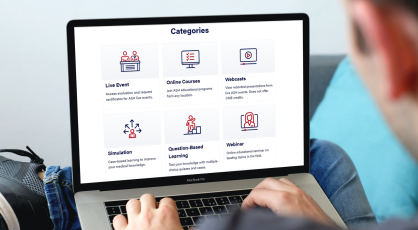
ASH Academy On Demand provides hematologists with the highest-quality and most up-to-date educational resources to guide learning at all career stages. In 2022, the Precision Hematology Webinar Series offered clinicians and researchers information on the latest technologies related to data acquisition, diagnosis, and decision-making for hematologic diseases. The Journal Club highlighted seminal papers in hematology published in Blood or Blood Advances. The IMPACT Learning series and audio lessons discussed racial disparities among African Americans with multiple myeloma and gave participants the chance to learn how to address barriers to care and strategies for culturally sensitive communication. The CAR T-Cell Therapy Consults were launched in 2022, providing learners with case-based guidance for identifying appropriate patients for CAR T-cell therapy and recognizing the toxicities associated with this treatment.
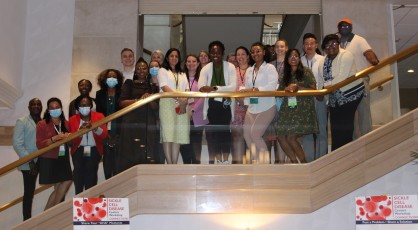
The 2022 Sickle Cell Disease Centers Workshop was held in-person for the first time since the pandemic. Health care providers convened to learn how to build comprehensive care centers to improve outcomes for adults living with sickle cell disease (SCD). The workshop, taught by SCD center leaders, addressed subjects such as developing business plans, advocating to stakeholders, the ins and outs of operations, and approaches to measuring impact while improving the quality of care provided in centers to help participants at institutions across the nation plan their own centers.
ASH supports hematologists around the world through its various awards including research grants, training programs, and other opportunities designed to enhance knowledge, research, and expertise. In 2022, ASH award programs continued the longstanding history of generous commitment of funding, training, and mentorship to support a new generation of ASH awardees.
Award Recipients Supported in 2022
Award Funds Committed in 2022
The Honorific Awards, ASH’s most prestigious awards, recognize exemplary hematologists who have made significant contributions to the field. The 2022 recipients are a diverse group of pioneering scientists, innovative clinicians, and selfless mentors who have advanced hematology through their work.
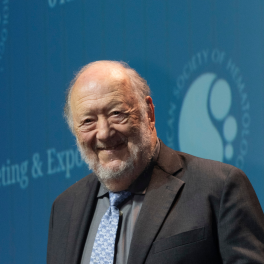
"How you train people is very important. You say, ‘Devise an experiment to answer the question you’re at. Let me know what it is.'"
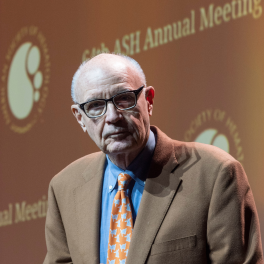
“It is likely that hematology will increasingly embrace the age of molecular immunology and molecular genetics. This approach will lead to clinical breakthroughs in particular for employing DNA/RNA modulation to correct human disease.”
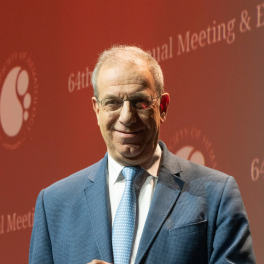
“I aspire to continue to improve care for PNH by making the treatment more effective, more convenient, and more widely available.”
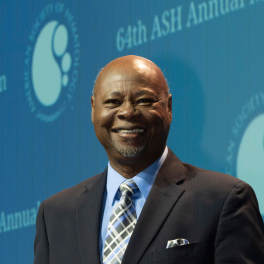
“I remain engaged with efforts to increase the rates of entry of under-represented groups into academia and health care — areas where we clearly need more diversity and need it urgently.”
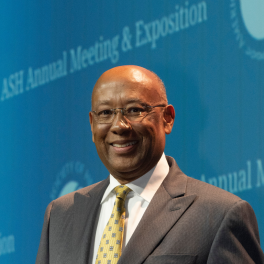
“Those two elements are mission critical. Mentorship and sponsorship early on in your career — you’ve just got to have that.”
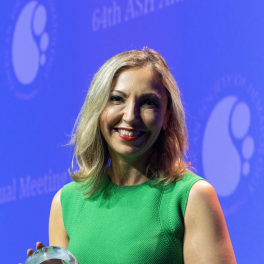
“I am excited to see the amazing discoveries and therapies that will be available in the next few years. I believe we will be able to apply our understanding of the molecular changes that occur in each patient, not only in their cancer genome but also the surrounding environment including the immune system and harness those alterations to identify precision medicine for each patient.”
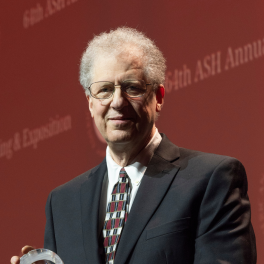
“There are so many ways of making a difference in patient well-being. Whether you choose to focus on clinical care with compassion or laboratory research with dedication, the personal rewards of taking care of highly vulnerable patients can be extraordinary. On both fronts, there is ample opportunity to directly improve patient lives on many levels.”
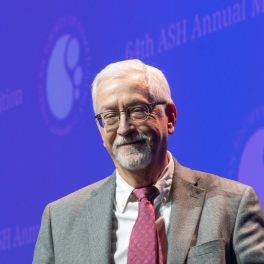
“With the ability to directly modify the outputs of genes that are relevant for each disease, the effectiveness of therapies will increase, and toxicities will decrease. Decades of additional work will be required to make this a reality, but it will be well worth it.”
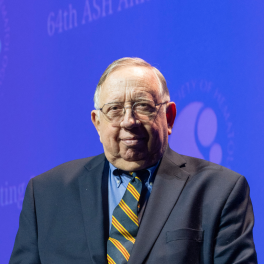
“It is an incredible honor to receive such an award from my peers. I feel that clinical curiosity has focused much of my research, so this award is also an honor I share with my mentors, collaborators, and mentees who have challenged me to learn from each patient I see.”
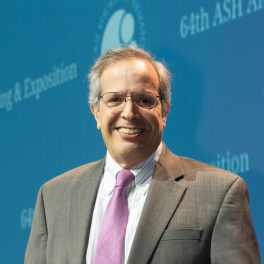
“While discovery is exciting and patient care very rewarding, I realize as my career has continued that it is the mentoring of the next generation of scientists and physician-scientists that is more important. So, I have worked hard to be always available to my mentees regardless of the issue, and to exude passion about what we do with the hope that they will continue to explore, discover, and teach.”
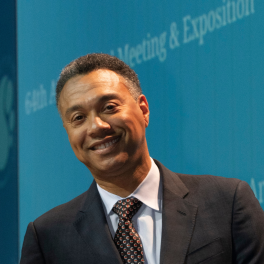
“My mentors were critical to career success, and I was compelled to pay it forward by mentoring the next generation of researchers. I greatly value the deep and long-standing relationships that I have had with many of my mentees across my career.”
These profiles show how the funding, training, and mentorship opportunities provided by ASH awards directly support the careers of future leaders in the field of hematology.

In 2009 and 2010, Dr. Imo J. Akpan received mentorship, career development, and research support from the ASH Minority Medical Student Award Program. The experience and ongoing support from her mentor Dr. Linda Burns nurtured her interest in hematology. Today Dr. Akpan is a successful classical hematologist focused on a variety of blood disorders including anemia, iron disorders, bleeding and clotting disorders, hemoglobinopathies, and more. She founded and is the Director of the Women’s Clinic for Blood Disorders at New York-Presbyterian/Columbia University Irving Medical Center to provide expedited access to a hematologist for women, especially pregnant women, with various blood disorders in the community. Early in 2022, her research on thrombosis with thrombocytopenia syndrome, a potentially life-threatening condition associated with viral-vector COVID-19 vaccines, contributed to the decision by the U.S. Centers for Disease Control and Prevention to recommend mRNA vaccination when possible.
ASH’s early investment in Dr. Akpan’s research career laid the foundation for her future of continued involvement in the Society. She serves on the ASH Women in Hematology Working Group and is currently coming full circle by serving on the MRI Programs Subcommittee to help support other promising clinicians and researchers from underrepresented minority groups and foster a diverse and growing hematology workforce.
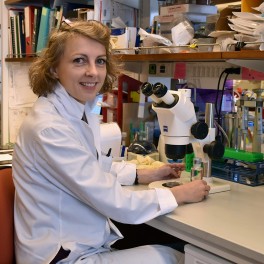
Dr. Coraline Mlynarczyk’s research progress was stalled in 2020 as a result of lab and facility closures during the early days of the COVID-19 pandemic. Her work had to be paused for several months, and her lab’s mouse lines were lost. She received an ASH Research Restart Award that allowed her to re-establish her mouse lines and complete her studies. ASH’s support for the continuation of her research was just the beginning of the Society’s investment in her as a future hematology leader. In the last two years she has received further support through the ASH Fellow to Faculty Scholar Award in basic/translational research, and her project was selected for an oral presentation at the 2021 ASH annual meeting as well as an ASH Abstract Achievement Award. She has recently authored a Science research article describing a novel mechanism of transformation for aggressive B cell lymphomas.
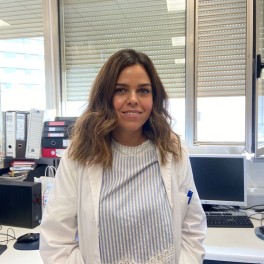
This year ASH honored the legacy of John Francis (Frank) Toohey with the creation of a new abstract achievement award dedicated to supporting the next generation of leaders in hematology through recognition of a highly meritorious trainee author and presenter of an annual meeting abstract submitted on the topic of myelodysplastic syndromes (MDS). The award was made possible through the generosity of Mary McGrane in memory of her husband Frank Toohey. The inaugural award recipient, Sofia Toribio Castello of the Universidad de Salamanca, shared work assessing the long-term safety of patients receiving lenalidomide.
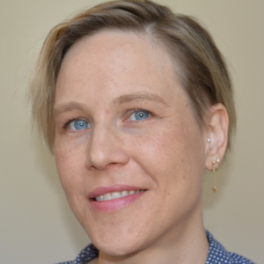
ASH established a new award honoring Peter Steelman, made possible through the Deerfield Foundation. The award is meant to honor the memory of Peter’s life and continue his legacy of kindness, respect, and hard work. The award supports Scholar Award recipients with acute myeloid leukemia (AML)-focused projects. Simone Riedel, PhD, of the Children's Hospital of Philadelphia, was the inaugural recipient of this award.
ASH continues to advocate for issues affecting hematology research and practice, including research and public health funding, access to quality care for patients, physician payment and coverage for hematologists, and policy issues related to sickle cell disease (SCD). This year also marked the return of an immersive advocacy program and the launch of new ASH-FDA collaborative workshop, both of which gave ASH members new opportunities to make their voices heard in support of hematology.
Meetings on Capitol Hill (virtual and in-person) in 2022
Grassroots Network Messages to Capitol Hill
For years, ASH has worked to educate members of Congress about the lack of quality care for individuals living with sickle cell disease (SCD). Since its 2021 introduction, the Sickle Cell Disease Comprehensive Care Act (H.R. 6216/S. 3389), which aims to improve access to care for SCD, gained 22 total cosponsors in the House and Senate. This growing show of support by members of Congress is a result of ASH’s advocacy on several fronts in 2022: ASH Grassroots Network members wrote and called their legislators, the ASH Committee on Government Affairs met with nearly 30 congressional offices in March, ASH spearheaded a joint letter with more than 60 other organizations urging Congress to advance the bill, and more.
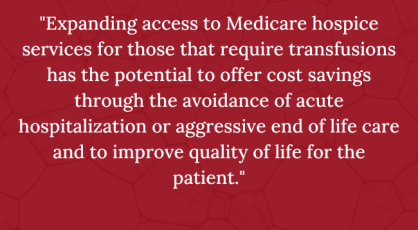
ASH continued to educate policymakers on the lack of access to blood transfusions in hospice care and advocate for the Improving Access to Transfusion Care for Hospice Patients Act, S. 2566, which would establish a demonstration program to promote the provision of palliative blood transfusions for patients receiving the Medicare hospice benefit.
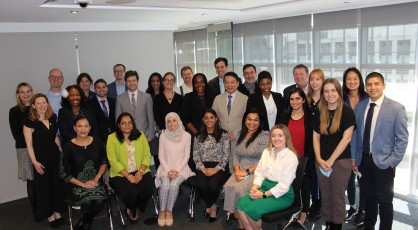
After a two-year hiatus due to the pandemic, the ASH Advocacy Leadership Institute (ALI) returned in 2022. ALI is an intensive two-day advocacy program for ASH members; 25 participants, joined by several members of the ASH Committees on Government Affairs and Practice, spent the first day at ASH headquarters learning about the legislative process and health policy, and on the second day turned their knowledge into action in support of hematology by traveling to Capitol Hill to meet with lawmakers.
It really is a one-of-a-kind program that offers a great opportunity for any ASH member to learn more about how the legislative process really works, and how we as practitioners and researchers can make sure our voices and concerns are heard on behalf of our patients.
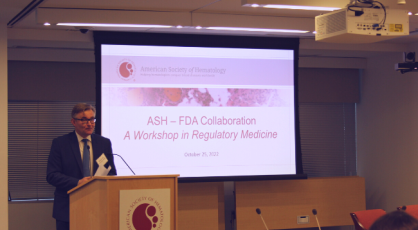
In October 2022, ASH and the U.S. Food and Drug Administration (FDA) cohosted the inaugural ASH-FDA Collaboration: A Workshop on Regulatory Science in Hematology at ASH headquarters. This two-day meeting allowed ASH members to gain a better understanding of the FDA as well as insight into regulatory issues in hematology drug development. More than 50 FDA and ASH members engaged on such topics as clinical and translational research, trial design, and drug development. Based on the success of the workshop, ASH and the FDA plan to offer it again next year.
ASH released a new policy Statement on a Strong Blood Supply, which supports steps to ensure a safe and adequate blood supply and to further encourage donations from all healthy people capable of donating.
As the world’s premier hematology organization, ASH continues to expand its global programs and services designed to help hematologists conquer blood diseases worldwide.
In partnership with the European Hematology Association (EHA), ASH contributed €50,000 to Helping to Leave, a non-profit organization dedicated to helping people evacuate areas of military conflict. ASH’s donation covered transportation and accommodation costs for hematology and oncology patients needing to evacuate and seek medical treatment after the invasion of Ukraine.

The ASH-led Consortium on Newborn Screening in Africa (CONSA) is an international network aiming to demonstrate the benefits of newborn screening and early interventions for children with sickle cell disease (SCD) in sub-Saharan Africa. In 2022, CONSA sites in the seven participating countries (Ghana, Kenya, Liberia, Nigeria, Tanzania, Zambia, and Uganda) screened more than 47,000 newborns and worked to link and provide care for 648 babies diagnosed with SCD.
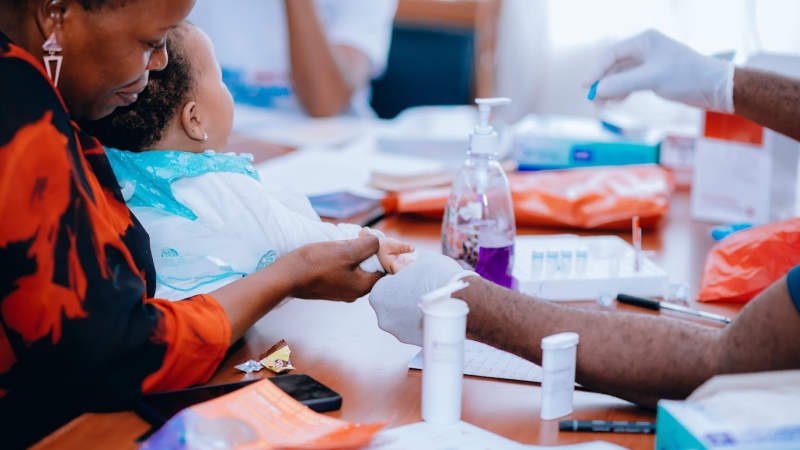
Parents of babies with sickle cell disease attend a one-day awareness and education meeting, sponsored by ASH, in Dar and Mwanza.
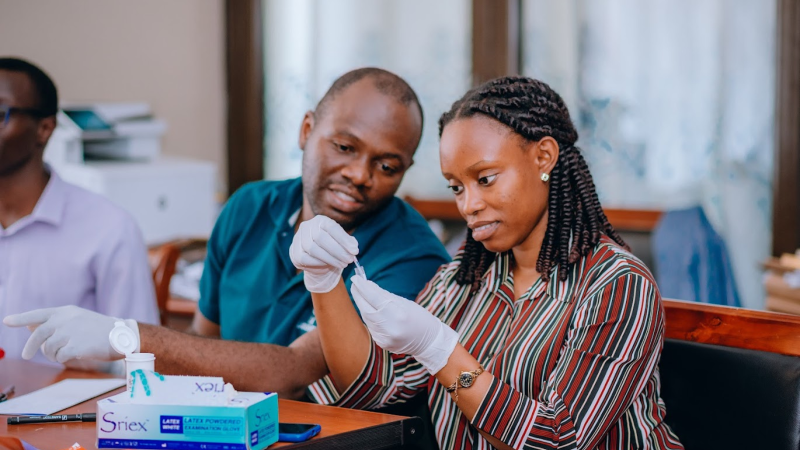
Medical staff in Dar and Mwanza receive training on newborn screening for sickle cell disease.
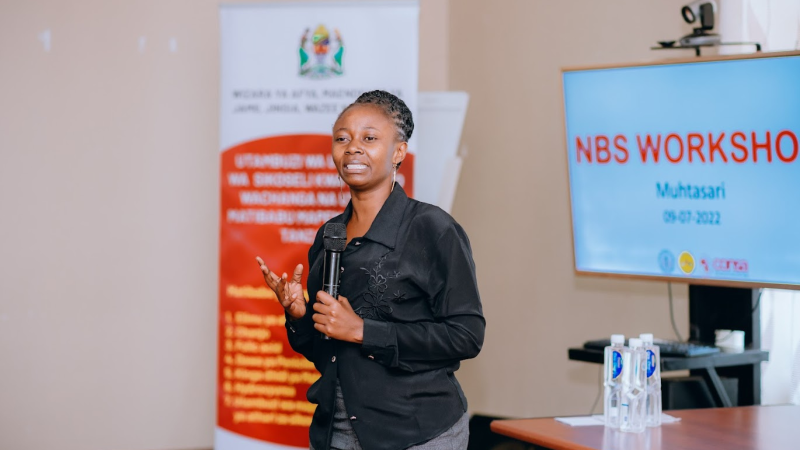
Parents of babies with sickle cell disease attend a one-day awareness and education meeting, sponsored by ASH, in Dar and Mwanza.
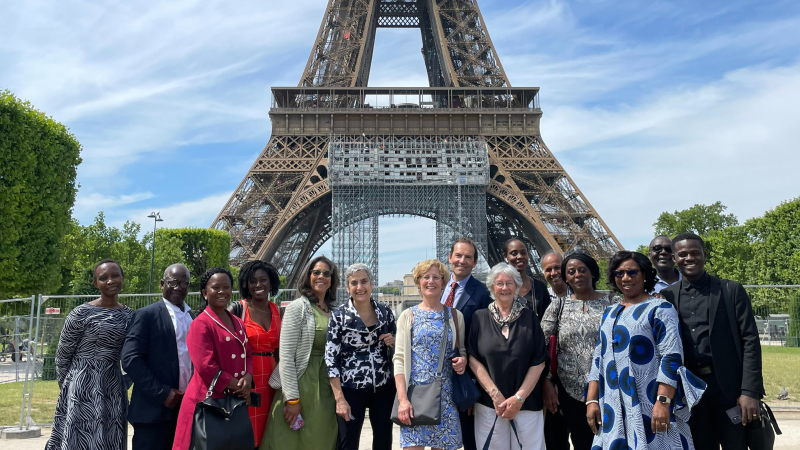
CONSA members attend the Global Congress on Sickle Cell Disease in Paris, France.
The ASH Global Research Award was designed to support future international scientific leaders, increase hematology capacity, and nurture global collaboration. In 2022, ASH committed funds to support 13 recipients from 12 countries.
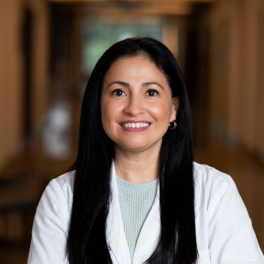
After receiving an ASH Global Research Award in 2018, Dr. Fabiola Valvert collaborated with her ASH global mentor Dr. David Weinstock to establish an independent research team and facilitate the improved diagnosis of lymphoma at hospitals in Belize and El Salvador. She authored a Blood Advances paper on low-cost, transcriptional diagnostics for lymphoma and continues her important clinical and research work in Guatemala. Upon successful defense of her PhD thesis, she is poised to become the first PhD of Hematology in Guatemala. She says, “all of this work was possible due to the funds from ASH.”
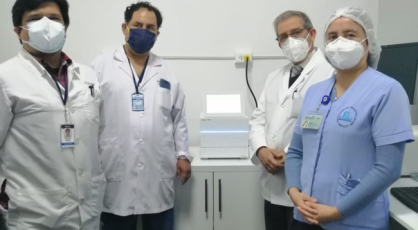
Established in 2004, the International Consortium on Acute Leukemia (ICAL) is a clinical consortium improving care for patients with leukemia in Latin America. Current member countries include Brazil, Chile, Paraguay, Peru, and Uruguay. Currently implementing a standard of care treatment protocol for acute myeloid leukemia, the consortium has enrolled 451 patients in the study. Based on the ICAL model, ASH established the Children’s International Consortium on Acute Leukemia to improve diagnosis and treatment of pediatric patients with acute lymphoblastic leukemia in the Caribbean. Current member countries include the Bahamas, Barbados, Jamaica, and Trinidad and Tobago.
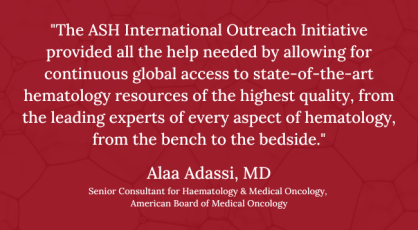
Hospitals and universities in low- and middle-income countries were provided with complimentary virtual access to educational materials through ASH’s International Outreach Initiative (IOI). More than 75 countries participated in the program, receiving free resources from ASH in their region.
As the world leader in hematology publications, ASH continues to uphold the highest standards for its publications, which cover the breadth of clinical and scientific research and education in the field of hematology. ASH publications – including two peer-reviewed academic journals Blood and Blood Advances, ASH Clinical News magazine, and The Hematologist member newsletter – play a monumental role in providing authoritative information and influencing practice.
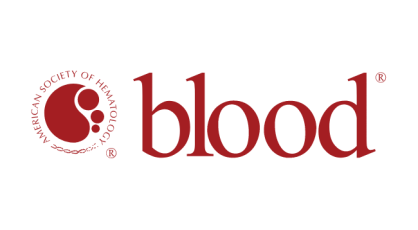
Blood published 905 articles in 2022, including review series covering COVID-19, virus-mediated hematologic disease, and erythropoiesis. Blood published articles on the International Consensus Classification of Myeloid and Lymphoid Neoplasms, as well as companion papers highlighting the use of genomic profiling in clinical decision making for these malignancies. A print compendium of the ICC articles was disseminated at the 2022 ASH Annual Meeting. The journal achieved an Impact Factor of 25.669, a Google Scholar h5-index of 165, and an Eigenfactor of 0.19549. Finally, Blood had 205,634 total annual citations, maintaining its position as the most cited journal in hematology and one of the most cited journals in science.
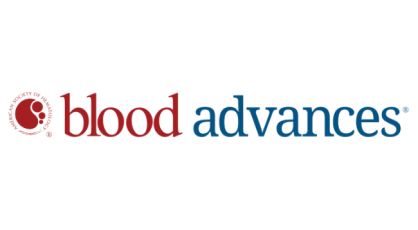
Blood Advances, ASH’s online, open-access journal, continues to grow in impact. The journal published 686 articles in 2022, with top-cited papers including one describing successful allogeneic hematopoietic stem cell transplantation in patients with VEXAS syndrome at two different centers and another describing humoral response to the mRNA anti-COVID-19 vaccines in patients with CLL. In 2022, the journal also continued to provide timely updates to the recommendations provided within ASH’s living guidelines on the use of anticoagulation for thromboprophylaxis for patients with COVID-19. Blood Advances achieved an Impact Factor of 7.642, a Google Scholar h5-index of 77, and an Eigenfactor of 0.04833. The journal also saw a significant increase in total annual citations to 13,517. The journal publishes more peer-reviewed hematology research than any other academic journal worldwide.
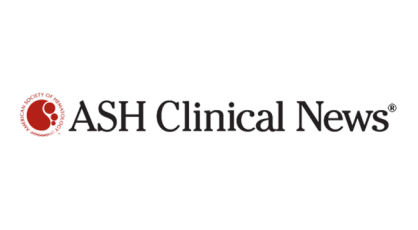
In 2022, ASH Clinical News continued to thrive under the leadership of Editor-in-Chief Aaron T. Gerds, MD, MS. The publication introduced a new editorial section, Algorithms in Hematology, which provides handy graphics to help clinicians determine the best treatment course for a variety of hematologic diseases, as well as “From the Desk of…,” a series of videos from the editor-in-chief introducing each issue. ASH Clinical News received five editorial awards during the year, including national bronze and regional silver Azbee Awards from the American Society of Business Publication Editors for a feature article on the unique issues of treating athletes for blood disorders, and a Communicator Award from the Academy of Interactive & Visual Arts for an editorial by Dr. Gerds.
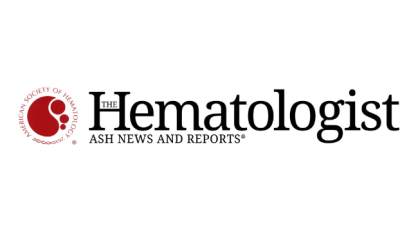
In 2022, The Hematologist selected the next Editor-in-Chief, Shaji Kumar, MD. Dr. Kumar will follow Laura C. Michaelis, MD, who served in the role for five years. Dr. Michaelis not only developed new editorial sections of The Hematologist but also oversaw the launch of The Hematologist podcast, which allowed hematologists to listen on the go.
Dr. Michaelis has had a truly transformative impact on The Hematologist. I am honored to follow in her footsteps and strive to advance the momentum she and the previous editors have built with this publication and companion podcast. I’m looking forward to making The Hematologist a medium for our community to connect over and to encourage participation from underrepresented minority, female, and junior faculty hematologists.
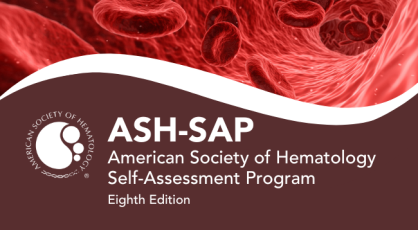
The ASH-SAP, a comprehensive resource to keep hematologists up to date on the latest advances in adult and pediatric hematology, published its 8th Edition in August 2022. ASH-SAP offers self-directed learning and review with case studies, key points, graphics, animation, and a glossary. The 8th Edition features 25 fully updated chapters, 17 videos, and more than 250 new case-based, multiple-choice questions.
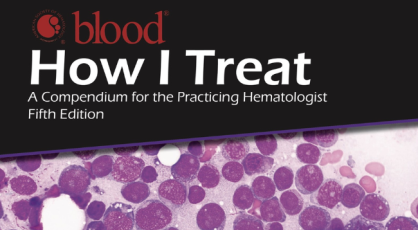
ASH published How I Treat 2022, a collection of the top “How I Treat” articles from Blood, many of which were updated to reflect the most recent scientific and clinically relevant information.
Fiscal year 2022 (July 2021-June 2022) was a year of investment for ASH. ASH funds went to support the ASH RC mission, in addition to continuing to expand existing efforts, fund new projects, and support ASH’s overall mission of fostering high-quality, equitable care, transformative research, and innovative education to improve the lives of patients worldwide with blood and bone marrow disorders.
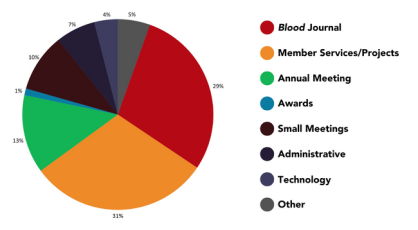
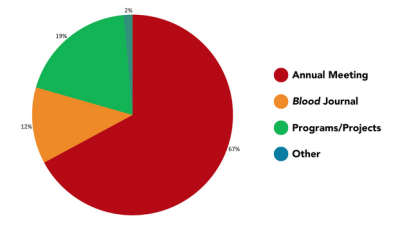
The ASH Foundation was created in 2012 to facilitate private philanthropic relationships with individual donors, foundations, and corporations that confer charitable grants. Thanks to generous donors, in 2022 the ASH Foundation provided additional resources to enhance and expand ASH programs dedicated to advancing hematology research, promoting career development and training, and making a global impact.
Disbursements in Fiscal Year 2022
ASH Foundation Donors in Fiscal Year 2022
Countries Represented by Donors in Fiscal Year 2022
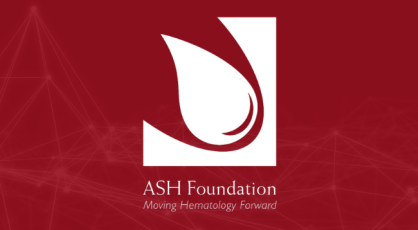
Through charitable support from the ASH Foundation, ASH is able to enhance and expand important hematology programs and pursue new, visionary initiatives.

The ASH Foundation Run/Walk set a record for number of participants (2,167) and doubled 2021’s revenue. Proceeds from the 2022 ASH Foundation Run/Walk supported the ASH Global Programs Fund.